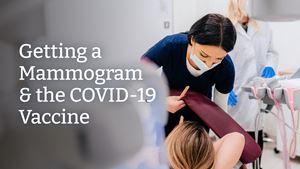
As the COVID-19 pandemic began to spread in 2020 and early 2021, patients across the United States delayed getting certain preventative screenings – mammograms among them. Now that the COVID-19 vaccine exists to protect the health of millions of people, women have begun to schedule their regular mammograms again.
Tara Gellasch, MD, is an OBGYN specialist, and Leah Rossett, MD, is a radiologist with subspecialty training in breast imaging – both with Rochester Regional Health. Their work with women gives each of them excellent insight on what to know in this unique season in healthcare.
There is now a return to normal screening recommendations. The American College of Radiology Breast Imaging recommends women at average breast cancer risk begin screening at age 40, while women with a higher risk of breast cancer may be advised to start screening even earlier. These recommendations are based on maximizing proven benefits to patients, including a substantial reduction in breast cancer mortality.
Women are strongly encouraged to conduct regular self breast exams and know how their breasts look and feel normally so they can be aware of any changes if they happen. If any changes do happen, they should be immediately reported to their primary care provider.
Some women held off on their annual mammogram or gynecological exam due to concerns related to COVID-19. As the COVID-19 vaccine is now available, women are encouraged to schedule their appointment for the vaccine and the booster shot if they are eligible.
With a small percentage of patients who receive the Pfizer or Moderna COVID-19 vaccine, temporary swelling may occur in the lymph nodes on their neck or under the arm on the same side where they receive their shot. This happens with approximately 11 percent of women after their first dose and 16 percent of women after their second dose, according to data from the CDC.
Doctors describe the swelling as a reaction by the body’s immune system, creating antibodies to fight a potential infection. Generally, it appears on a physical exam within 2-4 days of getting the vaccine, lasts for an average of 10 days, and then goes away. More subtle changes of the lymph nodes may be seen on breast imaging for longer, as they are more sensitive. Other vaccines may elicit a similar response by the immune system.
When you meet with the technologist who will be obtaining your mammogram, they should ask you a series of questions about what you need to know ahead of the screening.
Radiologists should be aware about the timing and site of administration of the COVID-19 vaccine because it may affect how they view the image. Swollen lymph nodes, should always lead to further investigation.
However, biopsy can usually be avoided as you will have a history of recent vaccination administration and the lymph nodes return to normal a few weeks or months.
The American College of Radiology/Society for Breast Imaging recommendations for unilateral axillary adenopathy is conservative and “stresses an abundance of caution.” The guidance suggests short term follow up imaging 4-12 weeks after the second vaccine dose.
“We remain as diligent in our interpretation of our patients’ mammograms as we have always been,” Dr. Rossett said. “COVID-19 has complicated many aspects of our lives; healthcare is no exception. Follow-up imaging can help us differentiate between a normal reaction to a vaccine and a more concerning symptom.”
Some people may ask the question, “Should I coordinate my COVID-19 vaccine appointment with my mammogram appointment?”
The American Academy of Radiology has created suggestions and resources related to the timing of the COVID-19 vaccine and mammograms.
Experts recommend that women get both whenever they are available. As long as there is clear communication about the timing of any vaccinations at the time of the mammogram, there should be no cause for concern.
“There is a difference between a real world scenario and a perfect world scenario,” Dr. Gellasch said. “In a perfect world, it might be reasonable to delay the mammogram for 4-6 weeks after receiving the COVID vaccine. But we know if that happened in the real world, we would see more women not receiving their mammogram at all.”
“Most importantly, we don’t women to miss their annual mammogram. Delaying a possible breast cancer diagnosis would be the worst outcome,” Dr. Rossett said.